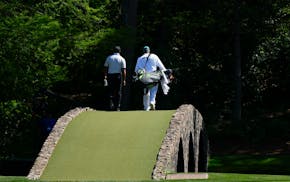The most artfully-written jokes are those that contain the punch line in the premise.
Like this one:
Adrian Peterson thinks his punishment is too harsh.
Tuesday morning, NFL Commissioner Roger Goodell suspended the Vikings star for the rest of the season without pay, meaning Peterson will not play for the Vikings again this season, and perhaps not ever.
Peterson's case is bound to become a quagmire of legal positioning, union rights, management overreach and the ongoing course corrections of one of the most powerful people in sports.
There is one matter that remains clear.
A powerful football player took a branch and beat a 4-year-old until the boy bled through large welts on his back, suffered defense wounds on his hands, and took at least one lash to his genitalia.
Peterson deserves no sympathy, and anyone arguing that he is being unfairly prevented from finishing the season with the Vikings hasn't done enough reading between the legalistic lines.
Peterson chose to be a legal pawn instead of a football king.
He has chosen to spend the rest of the season as a symbol of Goodell's arrogance rather than a standout football player.
Peterson could have found his way back to Winter Park this season. His path was cleared by a lenient Texas court. Had he displayed remorse over his acts, and sought counseling, and thrown himself at Goodell's feet, the commissioner likely would have levied a lighter sentence, perhaps even a retroactive one.
Instead, Peterson played into Goodell's hands, and Goodell must have cackled at the opportunity presented to allow him to display strength.
Peterson showed no real remorse. He did not promise to change his behavior. He chose to side with the NFLPA and his legal team in challenging Goodell's power.
If Goodell didn't have Peterson, he would have invented him.
Peterson's act and attitude are allowing Goodell to escape the stigma of mismanagement and apparent corruption that has clung to him like a spiderweb since he punished Ravens running back Ray Rice just two games after he punched his then-fiancée in a hotel elevator.
After years of promising to crack down on player misconduct, Goodell embarrassed himself by failing to punish Rice more severely. There were only two conclusions that could be drawn by his ruling: That Goodell was inept, or that he was more interested in doing a favor for the Baltimore Ravens than in carrying through on his self-imposed mandate.
Peterson whipping his son and failing to show remorse allowed Goodell to reinvent himself in real time. Thanks to Peterson, Goodell can set a new standard for player discipline. He will win no matter what happens in the courts.
Now that the arbitrator has ruled in his favor, he will again be viewed as one of the most powerful figures in sports, whether he is hated or respected for that status.
If the courts at large eventually overrule him, Goodell can claim to have taken a moral stand, whether the stand was moral or calculated.
By beating a child and then allowing himself to become a legal and procedural pawn, Peterson has damaged what could have become one of the greatest careers in league history.
He has sacrificed a year in his prime, in a system he said in August "is the offense of my dreams.'' In that same one-on-one conversation, Peterson said his goal was to become the greatest player, not just running back, of all time.
Until he beat his child bloody, Peterson could set grandiose goals because he is in many ways the perfect football player: supremely dedicated, astonishingly gifted, fiercely competitive, and unfailingly ambitious.
Until he beat his child, Peterson's reputation could easily survive any other perceived transgressions, including fathering multiple children with multiple women out of wedlock.
Many football fans and fantasy owners will howl about Goodell's decision, which is blatantly overreaching and yet just.
What should be remembered is a fact as simple as a one-sentence joke:
If Peterson hadn't severely whipped a 4-year-old, he'd still be wearing a Vikings uniform and chasing his extraordinary goals.
Jim Souhan's podcast can be heard at souhanunfiltered.com. Twitter: @SouhanStrib • jsouhan@startribune.com

Souhan: Why Tiger Woods should keep swinging
Souhan: Scheffler wins Masters again, shows what makes him special
Morikawa falters in final round at Masters

Keeping up with the Joneses who helped design Augusta National's classic back nine

